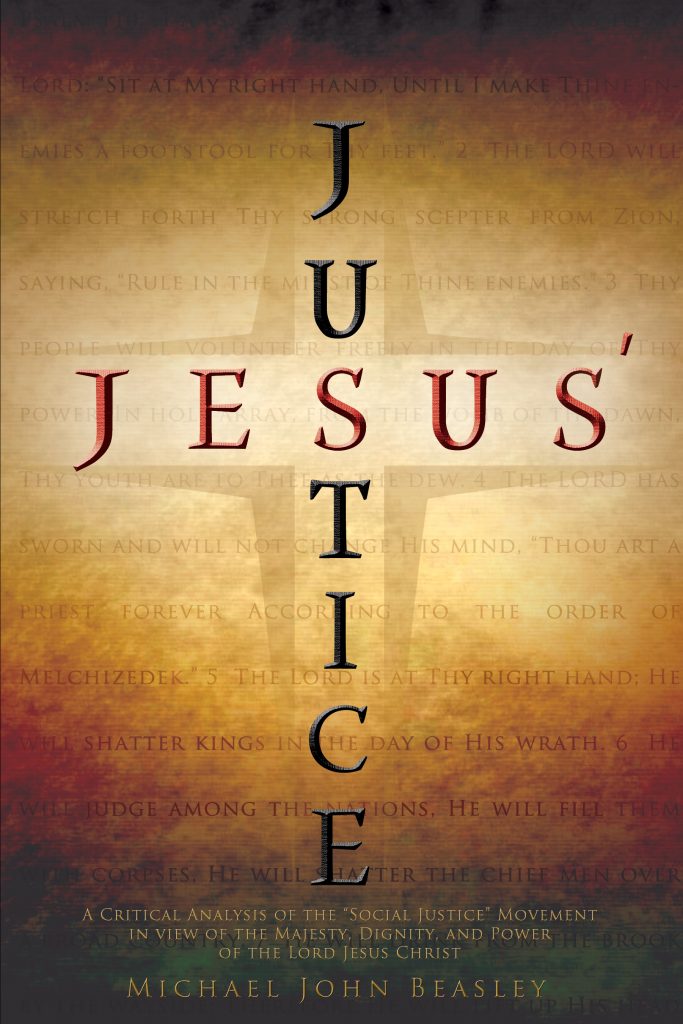
Jesus’ Justice
So many of the discussions that we hear today about “Social Justice” are missing the centerpiece of everything: Jesus’ justice. An observation such as this is not at all trivial. Those who try to define justice apart from the One who is holy, righteous, and just may as well try to build a sky-scraper without a blueprint or engineer. History reveals that when mere mortals contrive their own definitions and standards of justice, grave atrocities often result. Remarkably, this historical habit is occurring once again. Many today are proceeding as the torch-bearers of a new pathway to justice, fully arrayed with an army of academics, conference speakers, and New York Times best sellers. They are also armed with a unique, Social Justice dialect in which they dispense broad accusations of “white supremacy” and “systemic white racism” against modern society and even the church of Jesus Christ. Because of this movement’s enormity and repeated accusations, it would be highly dangerous to imagine that this ideology will go away anytime soon. For this reason, this book compares and contrasts the standards of Social Justice ideology (SJI) with that of Jesus and His holy justice. By this comparison, we will discover that the modern ideology of Social Justice blasphemously contradicts the Lord’s justice in multiple ways:
1. By heralding the wisdom of man above God (chapter 1).
2. By seeking to remedy past injustices with present day injustices (chapter 2).
3. By seeing oppression (whether real or perceived) as establishing personal merit and innocence (chapter 3).
4. By promoting faulty views of the human race and thereby advancing great ignorance and racial bigotry (chapter 4).
5. By advancing its own doctrinal creed and religious system of atonement which supplies no real solutions or true hope (chapter 5).
6. By promoting a false Gospel which generates bigotry, hatred, and resentment against others on the basis of their epidermis (chapter 6).
7. By mutilating history to such an extent that the triumphs of the Gospel, both past and present, are grotesquely obscured (chapter 7).
8. By replicating a racial bigotry that is comparable to some of the worst expressions of bigotry from the past (chapter 8).
9. By falling short of any comprehensive understanding of universal sin, systemic evil, and God’s sovereign providence over all (chapter 9).
By this comparison, we will discover the bankruptcy and dangerous nature of this man-made philosophy which has become a religion for many. This comparison will also reveal what Scripture describes as the greatest contest in human history in which “the nations rage against the Lord and His Anointed” King (Psalm 2). And who is this Anointed King? He is Jesus Christ, the exalted Redeemer (Psalm 110:1) and “King of Righteousness” (Psalm 110:4) who will someday judge the living and the dead in His perfect and holy justice (Psalm 110:5-6).
In the end, without a serious consideration of Jesus and His justice, nothing else really matters.
Copyright © 9/29/2021
Available at Barnes & Noble and Book Depository. Also available at Amazon.com in Kindle, paperback, and hardback
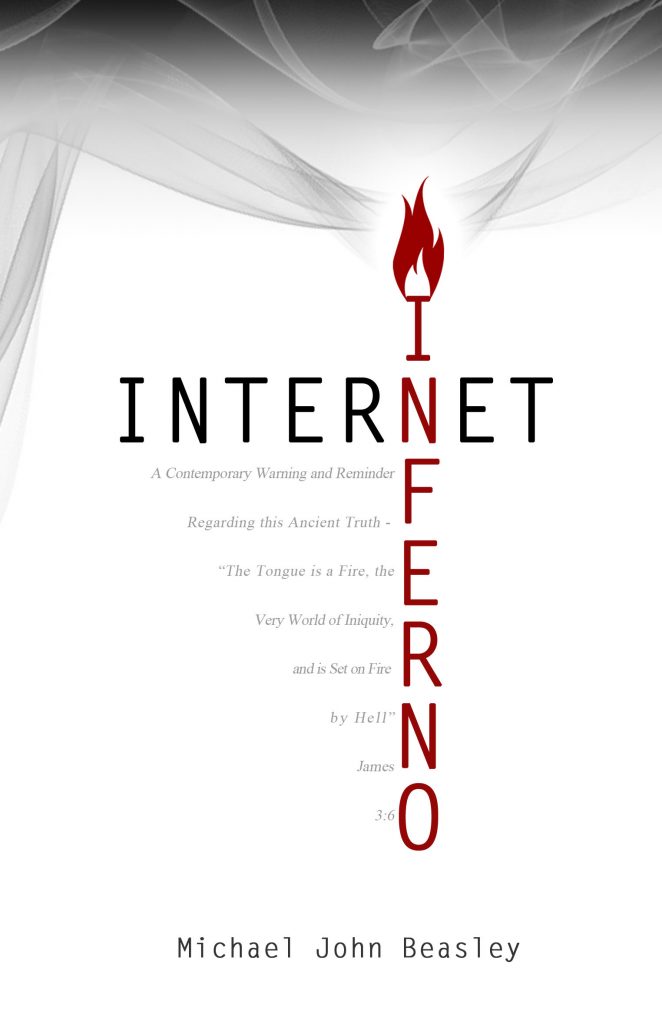
Internet Inferno
While the Internet is a helpful tool in many ways, it has also become a cesspool for all forms of gossip and malicious slander. Many who use electronic media today seem to have little regard for the damage that can be done to the reputation of others through the issuance of lies and deception. What is especially troubling about this problem is that few today are aware of the divine judgment that awaits all those who bring about such destruction by their words (Proverbs 6:16-19, Revelation 22:15). Whether you are a Christian or not, this subject should give everyone serious pause regarding their conduct, thoughts, motives, and their every typed or spoken word. Though men may think nothing of slandering another human being, who is made in God’s image (James 3:9), the Creator does not share such indifference. One day His justice will come and everything that has been said in secret will be made known before His holy tribunal (Luke 12:2-3). Thus, Internet Inferno has been written in order to issue a contemporary warning and reminder of this ancient truth:
James 3:6: “…the tongue is a fire, the very world of iniquity; the tongue is set among our members as that which defiles the entire body, and sets on fire the course of our life, and is set on fire by hell.”
What James sets forth in this passage is quite grave and sobering. By it he seeks to awaken us out of the dangerous indifference that often prevails in our communication. Of course, the tongue is merely a vehicle of communication and nothing more. In the end, the tongue is not the principal danger, it is the human heart that has the dark capacity to unleash hell, or, as Jesus said: Matthew 15:19: “…out of the heart come evil thoughts, murders, adulteries, fornications, thefts, false witness, slanders” (Matthew 15:19, 12:34). It is for this reason that every word we speak avails the opportunity to consider the motives and thoughts of our hearts, to the end that we might also contemplate the eternity of our souls.
“This is a superb book and a needed exhortation, but be forewarned: it’s deeply convicting.”
Phil Johnson, Pastor/Elder serving at Grace Community Church and Executive Director of Grace to You.
“The level of acrimony in our current mass-media, politics, and academic discourse shows how destructive rash communication can be. Those of us who write critically about ideas on the Internet really need to consider seriously and heed these warnings.”
Bruce Davidson, professor at Hokusei Gakuen University in Sapporo, Japan and board member of the Jonathan Edwards Center Japan.
Available at Amazon.com in Kindle and paperback.
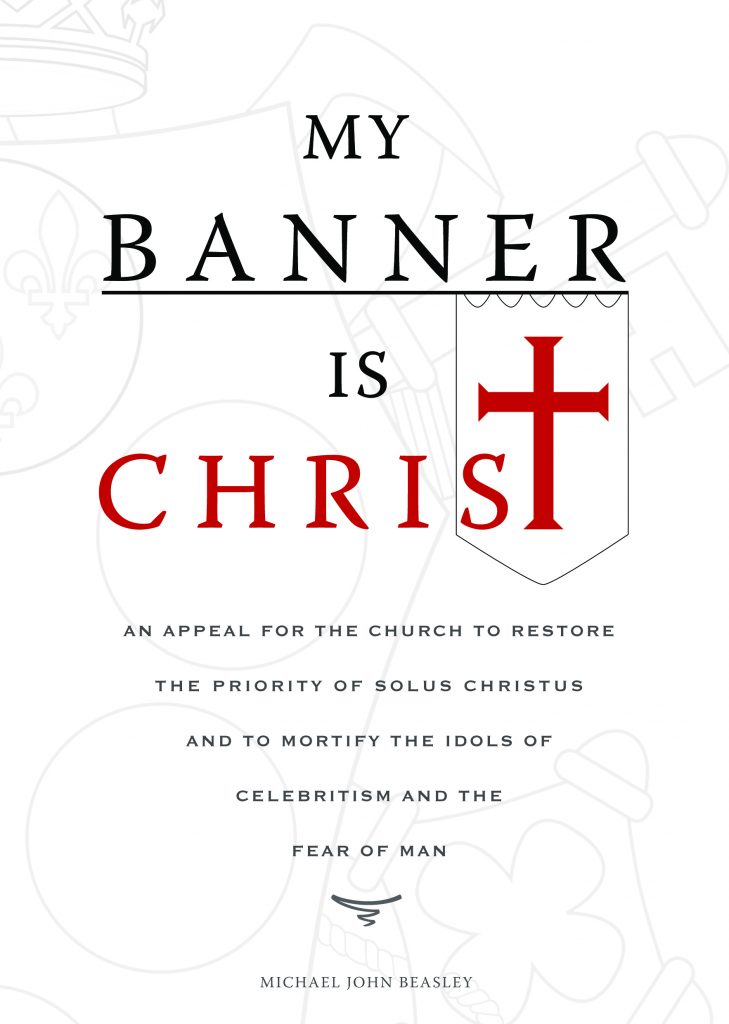
My Banner is Christ
Exodus 17:15: And Moses built an altar, and named it The LORD is My Banner.
The church is called to be the pillar and support of the truth (1 Timothy 3:15), not the pillar and support of Evangelical celebrities. Unfortunately, this plain and obvious truth has fallen on hard times within modern Evangelicalism.
When the church becomes more enamored with popular individuals, or things that are deemed as “trendy,” she enters into a dangerous flirtation with man-centered priorities. The church is not called to imitate the world which demands that it have its various celebrities and idols (professional athletes, pop icons, movie-stars, internet-idols etc.). Instead, she is called to a much different standard – the higher standard of exalting Christ and His authority alone (Solus Christus, Sola Scriptura).
Modern Evangelicalism has a great need to be restored to the priorities of Solus Christus and Sola Scriptura. The Reformers heralded these priorities for a very important reason – if Christ is not the church’s first love and sole authority, then all is lost. While there is nothing inherently wrong with the idea of celebrating God’s grace in the lives of godly individuals and their ministries, there is everything wrong with the idolatry of celebritism: the act of exalting men in a way that diminishes the glory and sole authority of Jesus Christ. It is important to recognize that the sin of worshipping the creature rather than the Creator is as natural to human nature as is breathing (Romans1:25). In light of such human frailty, the church must mortify the temptation of heralding mere men above their station, whether by fear or fawning devotion. In order to accomplish this goal, God’s people must remember that they are called to be subject to one another in the fear of Christ, alone (Ephesians 5:21). We can be sure that, wherever such reverence and adoration for Christ waxes hot, man-centered idolatry will wane and die. In the end, the church is called to exalt and magnify the risen and returning Savior, while raising the very banner of truth which He has entrusted to those who adore and fear Him (Psalm 60:4).
Table of Contents:
Introduction – He Has Given Us a Banner
Chapter I – Lessons from History with Pillars of Warning
Chapter II – Being Subject in the Fear of Christ
Chapter III – Celebritism and the Worship of the Nehushtan
Chapter IV – Solus Christus Versus Man-Centered Partisanship
Chapter V – You Cannot Serve Two Masters
Chapter VI – Solus Christus in the Land of Sodom and Gomorrah
Chapter VII – Solus Christus in the Home and Church
Chapter VIII – Solus Christus in the Land of Beulah
Chapter IX – Not all are Teachers
Conclusion – The Palace that is Called Beautiful
Appendix – Part I: John Bunyan, John Flavel, and the Fear of God
Appendix – Part II: The Fear of Christ in Marriage and Family
Appendix – Part III: Thomas Manton’s Epistle to the Reader
Available at Barnes & Noble and Book Depository. Also available at Amazon.com in Kindle, paperback, and hardback.
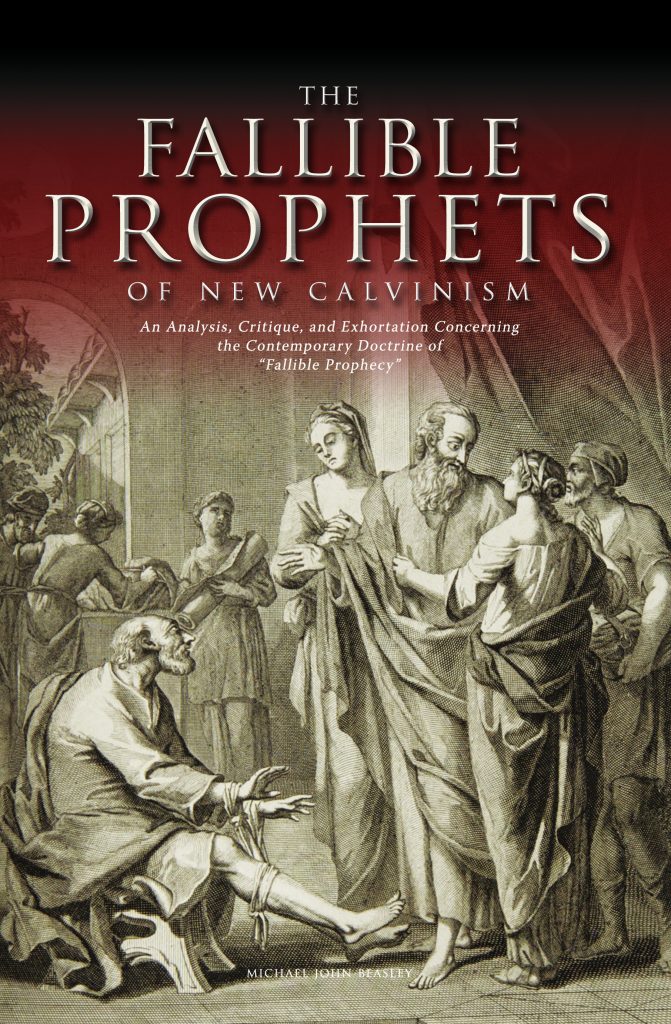
The Fallible Prophets
of New Calvinism
This book examines Wayne Grudem’s controversial teaching on fallible prophecy in view of various lexical, exegetical, and historical points of analysis. It also addresses the teaching’s popularity and continuing advancement through many charismatics within the “New Calvinism” movement. The doctrine of fallible prophecy is neither benign nor harmless, rather it constitutes a troubling strange fire for the body of Christ and continues to spread through the advocacy of popular continuationists like Wayne Grudem, D.A. Carson, John Piper, and Mark Driscoll:
“Not only does fallible prophecy have no real value, it is dangerous and can lead the gullible to take very unfortunate actions…since Grudem is the Neo-Calvinist theologian leading the charge in attempting to develop and defend the position of fallible prophecy, Beasley primarily interacts with his writings. His carefully presented argument leads to the conclusion that Grudem is reasoning from both ignorance of New Testament times, as well as from silence. Beasley has done the church a wonderful service by producing this volume. My hope is that many will read it and absorb its contents.”
Gary E. Gilley, Pastor-teacher, Southern View Chapel, Springfield, Il:
Contents:
1. Chapter 1: Prophecy – A Test of Love: According to the proponents of fallible prophecy, the presence of error in a prophetic utterance does not make such claimants of the prophetic gift false prophets, it only means that they are New Testament fallible prophets by definition. This constitutes a complete reversal of meaning of prophecy which results in a confused message concerning the nature and character of the God who has consistently and effectually revealed Himself through His appointed messengers. Moreover, such a redaction of prophecy effectively confuses, and nearly eliminates, the scripturally prescribed tests for prophecy. The importance of this must not be underestimated, for all of the tests of prophecy, in the Old Testament and the New Testament, have an unimpeachable centerpiece: the love of God.
2. Chapter 2: Fallible prophecy – Lexical Considerations: Grudem argues that the New Testament connotation of the word prophet no longer possessed the sense of authority it once had. In view of Grudem’s emphasis on this point, chapter 2 examines Grudem’s lexical justification for such a position.
3. Chapter 3: Fallible prophecy – The Case of Agabus: One of the most central arguments for fallible prophecy is founded on Agabus’ prophecy in Acts 21:11. Like Grudem, D.A. Carson insists that Agabus’ prophecy was fraught with error: “I can think of no reported Old Testament prophet whose prophecies are so wrong on the details.” This serious accusation establishes the basis for a thorough examination of Agabus in the 3rd chapter.
4. Chapter 4: Fallible prophecy – A Gift for All?: The advocates of fallible prophecy argue that the NT gift of prophecy was extremely common and functioned “in thousands of ordinary Christians in hundreds of local churches at the time of the New Testament.” In addition to this, Grudem argues that neither grave error nor immaturity should serve as a barrier to the pursuit and exercise of such a gift by nearly everyone within the local church. Such thinking is a tragedy for the body of Christ which is called to holiness and truth in all aspects of life and servitude.
5. Conclusion: The Fallible Prophets of New Calvinism: Believing in the value and efficacy of fallible prophecy, a growing number of popular pastors and teachers are now openly promoting such teaching. Particularly within the increasingly popular New Calvinism movement we find a growing number of advocates of fallible prophecy. To facilitate the spread of this doctrine, Grudem himself supplies a 6-point strategy for establishing fallible prophecy within the local church. This poses an increasing danger of the tolerance and proliferation of false prophets within the church.
Available at Barnes & Noble and Book Depository. Also available at Amazon.com in Kindle, paperback, and hardback

Altar to an
Unknown Love
2 Timothy 3:1,4: “In the last days…men will be…lovers of hedonism [φιλήδονοι]…”
For centuries, the world of professing Christendom has faced countless contests regarding the nature of God’s justice and love, as well as the doctrines of Heaven and Hell. Rob Bell’s book, Love Wins, is just another illustration of this reality. The entire protest revolving around Bell’s book was fairly dramatic, however, it produced more smoke and heat than productive light. Despite the loud complaints leveled against the controversial author of Love Wins, what he unveiled in his book should have produced little surprise. There is a very important and untold story behind the whole Bell debate that must be passed on for the sake of future generations. The mystery and oddity of this conflict has revealed a systemic problem – one that is much greater than the premature protests surrounding Rob Bell. Altar to an Unknown Love addresses the untold story which stands behind the scenes of Bell’s particular views of theology. What the reader may find surprising is that Bell’s teachings are remarkably familiar, and have even been promoted, whether directly or indirectly, by some of Bell’s loudest critics. All of this points to a great opportunity for the church in the present day. The conflict surrounding Rob Bell actually supplies an opportunity to rediscover our need to go back to the Scriptures themselves, rather than to the teachings and traditions of men. This is an opportunity for the church to rediscover the priority of Sola Scriptura, now, and for the generations to come.
Back Cover: “Rob Bell’s Love Wins: A Book About Heaven, Hell and the Fate of Every Person who Ever Lived, has been condemned by evangelicals who are, at the same time, professed admirers of authors from whom Bell has drawn, namely, George MacDonald and C.S. Lewis. Beasley challenges the consistency of this procedure, and if his book is taken seriously – as it deserves to be – it must promote more controversy, for MacDonald and Lewis are widely respected figures. A reconstructed presentation of the love of God – to be found in all the authors Beasley is critiquing –produces teaching which carries no offence to the natural man. What is more offensive to the natural man than truth concerning the justice of God and his wrath against sin? But that offence is eliminated by the subjective, man-centered teaching here reviewed. Yet, instead of starting with Scripture, Lewis believed that considering love in man can help us to understand love in God. A major part of Altar to an Unknown Love is a refutation of this error. The love to be found in unregenerate man is self-love – love centering around the pursuit of pleasure and identified by the Greeks (and by Lewis) as eros. But the love of God (never called eros in the New Testament) is altogether different, and is unknown until a person is born of God (1 John 4:7-10). To our mind he proves the case that Lewis is now so widely acceptable in American evangelicalism because non-biblical ideas are not being recognized for what they are. Artistry in writing, effective story-telling, with a mixture of ‘disconnected scriptural references and thoughts’, are able to achieve wide success in a day when discrimination has given way to popular appeal.”
Reverend Iain H. Murray
Former Editorial Director
& Joint Founder of Banner of Truth Trust
For more information, go to: ataul.thearmoury.org
Available at Barnes & Noble and Book Depository. Also available at Amazon.com in Kindle, paperback, and hardback
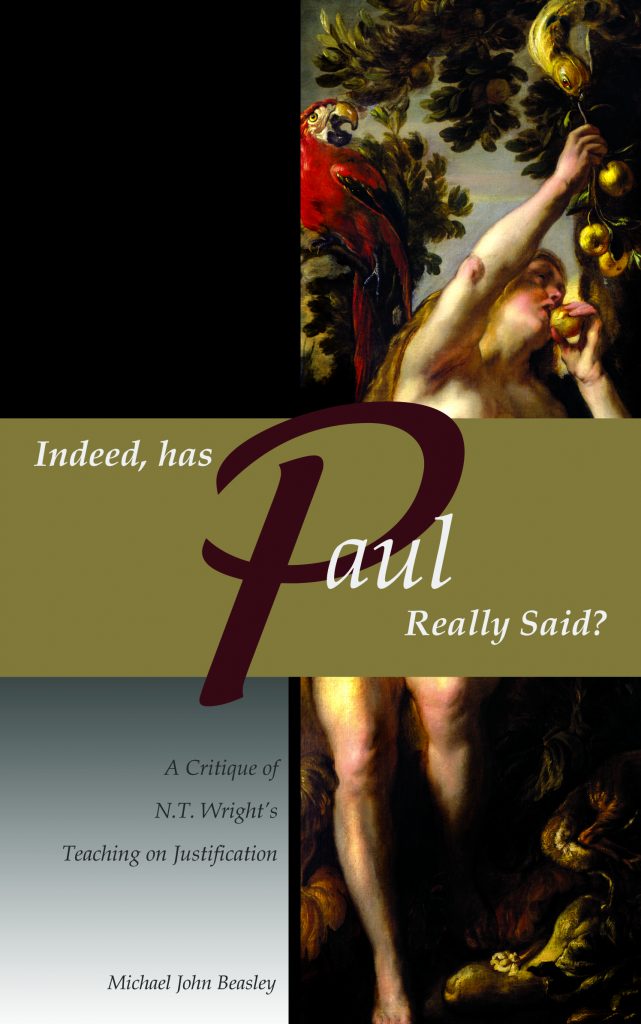
Indeed, has Paul
Really Said?
It was Martin Luther who said that the doctrine of justification byfaith is “the doctrine by which the church stands or falls.” Inreflection of this reality, Indeed, has Paul Really Said? is set forthas a modern-day defense of the crucial doctrine of justification against those who seek to undermine it by means of the theological innovationsof men like N. T. Wright. In particular, Indeed, has Paul Really Said?is a directed critique of Wright’s own work: What Saint Paul Really Said (Eerdmans Publishing, 1997). But rather than perusing every nuance ofWright’s position, this book simplifies matters by revealing theAchilles’ Heel of Wright’s teaching regarding the expression – therighteousness of God – through four comprehensible and reproducibleevaluations regarding:
A lexical Analysis of the terms – righteousness, justification, and the expression, the righteousness of God.
The forensic [judicial] connotation of these terms.
The relevance of Paul’s background as a Pharisee.
The manner in which justification is revealed within the whole counsel of God’s Word.
The appendix contains five critical responses from N.T. Wright, includinghis statement of having “significantly” influenced John Piper’s work,The Future of Justification, before it was published. From beginning toend, Indeed, has Paul Really Said? clearly reveals that the doctrine ofJustification requires the strongest possible defense that can beafforded by those who seek to herald the Gospel of Jesus Christ.Anything less than this will prove to be a great danger to the church.This istrue for our generation, just as it has been in every generation.
Copyright Year: © 2008
Available at Barnes & Noble and Book Depository. Also available at Amazon.com in Kindle, paperback, and hardback
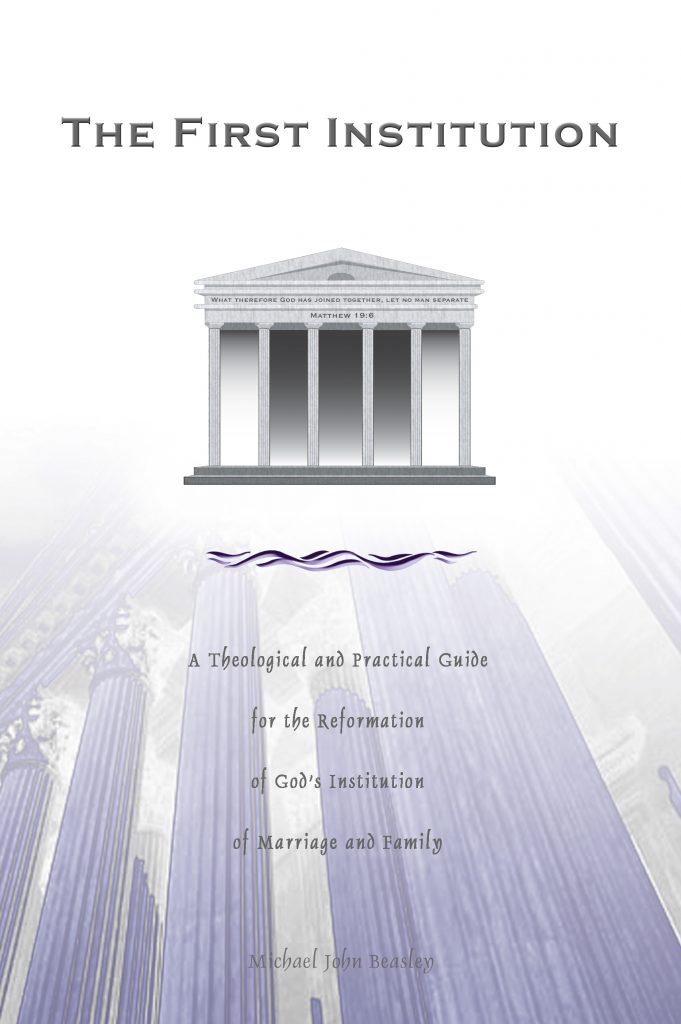
The First Institution
Amidst a culture of materialism, entertainment, and career-worship the modern family faces a panoply of challenges. Today, family unity has become a rare commodity and this problem is not receiving the attention it needs from the modern church. But there is hope. Parents must guard the priority established within Holy Writ: to commend their children to the Lord, rather than to the world. In order for the family of God to sail successfully through the storms of life, they must be firmly established within the sure course of God’s Word. Only then can they experience the joy, peace, and unity that is found alone in the Lord Jesus Christ. The challenges to this priority are many, but surrender is no option. The First Institution was written in order to chart such a Scriptural course for the family of God. From Genesis to Revelation this book examines the most relevant passages of Scripture which address these often neglected subjects of family life. But this book invests itself in a much deeper question: why did God create the institution of marriage? No one should think that this is an ancillary query; it is an absolutely crucial question, and formulates the very heart and soul of The First Institution, from the first page to the last.
Available at Barnes & Noble and Book Depository. Also available at Amazon.com in Kindle, paperback, and hardback

All Nations
Under God
Sadly, it is not uncommon to find bitter contention amidst those discussions centering on the atonement of Christ. Queries regarding the atonement’s intent and extent normally govern such contests, and the results are often less than productive. This debate is not a new one, and it has only intensified in recent years. In its worst form, this battle is draining the church of her vitality and joy, while robbing Christ of His glory as the victorious Lamb of God. However, the church must refute such contention and reclaim the joy, motivation, and power of the Gospel ministry by looking intently at the One who calls Himself the eternal Victor: The Lord Jesus Christ. All Nations Under God looks to restore the true hope and joy of the church by reclaiming the Biblical vision of the Lamb of God who was slain for our sin.
Contents –
Chapter 1: Christ’s Victorious Atonement Defined
For Whom Did Christ Die?
The Intent of Christ’s Atonement
The Immutability of Christ’s Atonement
The Extent of Christ’s AtonementChapter 2: Christ’s Victorious Atonement Defended
A Defense, Not a Diatribe
A Defense of the Lord’s Justice & Mercy
A Defense of the Lord’s Exceptional Love
A Defense of the Lord’s Extensive Atonement
“Victory” Means “Victory” all of the TimeChapter 3: Christ’s Victorious Atonement Applied
Listening to the Victorious Lamb
The Greatest of these is Love
The Exceptional Love Of A Husband
The Exceptional Love Of A Wife
The Exceptional Love Of Heaven’s Citizens
The Exceptional Love Of The Brethren
The Exceptional Love Of God’s Messengers
Following The Victorious LambChapter 4: Christ’s Triumph Over Tradition
Christ’s Triumph Over Tradition
The Trauma Of Tradition
The Tradition of Free Will
The Tradition of Hypercalvinism
The Tradition of Unexceptional Love
The Tradition Of “Whosoever”
There Are Foolish Men On Both Sides Of The ArgumentConclusion: Celebrating His Victory for all Eternity
Fixing Our Eyes on Jesus
His Holy and Eternal Victory
Adoring the Lamb of God Forever
Available at Barnes & Noble and Book Depository. Also available at Amazon.com in Kindle, paperback, and hardback
